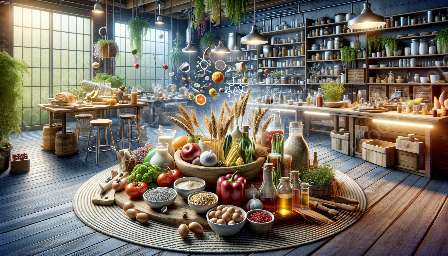Food additives play a critical role in modern food production, influencing taste, texture, and appearance. They are integral to the field of culinology, where science meets the art of cooking and food production. Understanding the impact of food additives and their interplay with food ingredients is essential to creating high-quality, safe, and appealing food products.
The Role of Food Additives in Modern Food Production
Food additives are substances added to food products to preserve flavor or enhance its taste, appearance, or other qualities. They can help improve food texture, extend shelf life, and maintain nutritional content. Common food additives include preservatives, colorants, flavor enhancers, and sweeteners. These additives are carefully regulated to ensure consumer safety and to meet specific quality standards.
Understanding Food Ingredients and Their Relationship with Food Additives
Food ingredients are the components used in food production, including additives, preservatives, and natural elements such as fruits, vegetables, grains, and proteins. The relationship between food ingredients and food additives is crucial in the development of new food products. Culinologists work with a variety of ingredients and additives to create innovative and high-quality food products that meet consumer demands and expectations.
Culinology: Bridging Science and the Art of Cooking
Culinology is the interdisciplinary study of culinary arts and food science. It encompasses the development of new food products, the understanding of food ingredients and additives, and the exploration of culinary techniques to optimize food quality. Culinologists collaborate with food scientists, chefs, and nutritionists to create innovative, safe, and delicious food products while considering the impact of food additives on flavor, texture, and overall sensory experience.
Exploring the Impact of Food Additives
Food additives can significantly impact the sensory properties of food products. They enhance flavors, improve appearance, and contribute to the overall enjoyment of food. For example, colorants can make food visually appealing, while preservatives help extend the shelf life of perishable items. However, the use of food additives also raises concerns about potential health risks and allergies, making it crucial to strike a balance between enhancement and safety.
Regulations and Safety Considerations
Given the widespread use of food additives, regulatory agencies such as the Food and Drug Administration (FDA) and the European Food Safety Authority (EFSA) have established strict guidelines for their safe usage. These regulations include permissible levels of additives, labeling requirements, and safety evaluations to ensure that food additives do not pose harm to consumers. Culinologists and food scientists play a vital role in adhering to these regulations while innovating with new flavors and food concepts.
Conclusion
Food additives are integral to modern food production, impacting taste, appearance, and shelf life. Their interplay with food ingredients and culinology shapes the development of new and exciting food products. By understanding the impact of food additives and complying with safety regulations, culinary professionals can create delicious, safe, and innovative food experiences for consumers.

